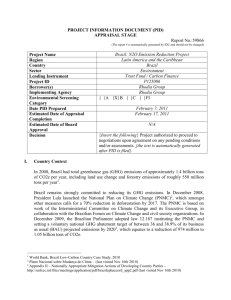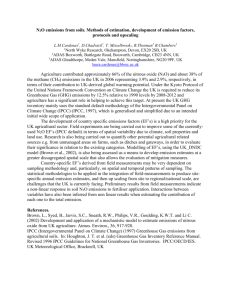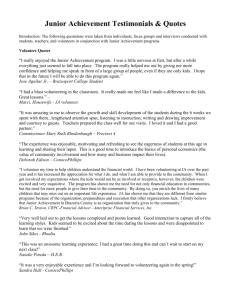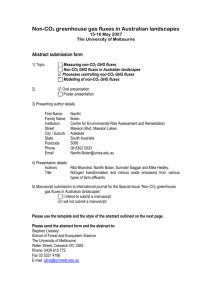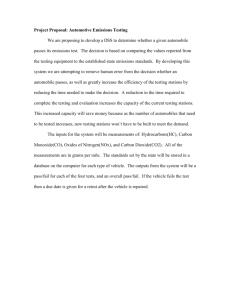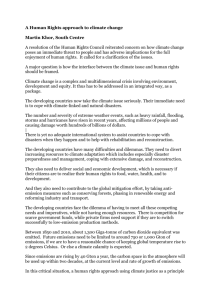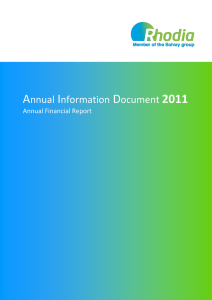SUMARIO EXECUTIVO - Documents & Reports
advertisement
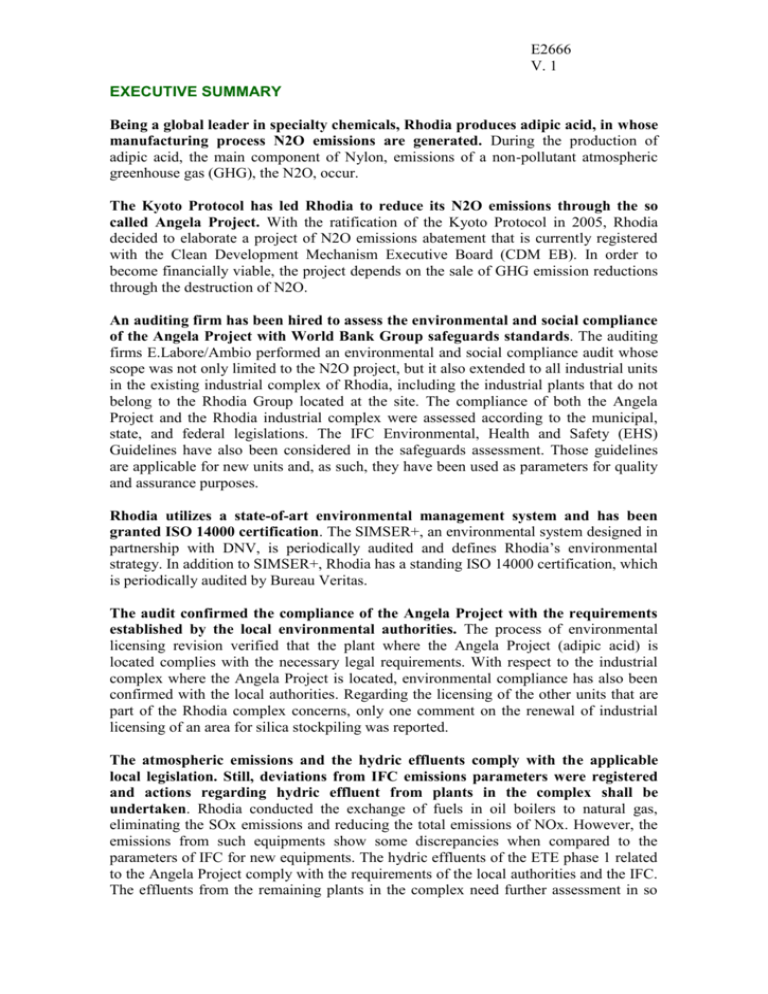
E2666 V. 1 EXECUTIVE SUMMARY Being a global leader in specialty chemicals, Rhodia produces adipic acid, in whose manufacturing process N2O emissions are generated. During the production of adipic acid, the main component of Nylon, emissions of a non-pollutant atmospheric greenhouse gas (GHG), the N2O, occur. The Kyoto Protocol has led Rhodia to reduce its N2O emissions through the so called Angela Project. With the ratification of the Kyoto Protocol in 2005, Rhodia decided to elaborate a project of N2O emissions abatement that is currently registered with the Clean Development Mechanism Executive Board (CDM EB). In order to become financially viable, the project depends on the sale of GHG emission reductions through the destruction of N2O. An auditing firm has been hired to assess the environmental and social compliance of the Angela Project with World Bank Group safeguards standards. The auditing firms E.Labore/Ambio performed an environmental and social compliance audit whose scope was not only limited to the N2O project, but it also extended to all industrial units in the existing industrial complex of Rhodia, including the industrial plants that do not belong to the Rhodia Group located at the site. The compliance of both the Angela Project and the Rhodia industrial complex were assessed according to the municipal, state, and federal legislations. The IFC Environmental, Health and Safety (EHS) Guidelines have also been considered in the safeguards assessment. Those guidelines are applicable for new units and, as such, they have been used as parameters for quality and assurance purposes. Rhodia utilizes a state-of-art environmental management system and has been granted ISO 14000 certification. The SIMSER+, an environmental system designed in partnership with DNV, is periodically audited and defines Rhodia’s environmental strategy. In addition to SIMSER+, Rhodia has a standing ISO 14000 certification, which is periodically audited by Bureau Veritas. The audit confirmed the compliance of the Angela Project with the requirements established by the local environmental authorities. The process of environmental licensing revision verified that the plant where the Angela Project (adipic acid) is located complies with the necessary legal requirements. With respect to the industrial complex where the Angela Project is located, environmental compliance has also been confirmed with the local authorities. Regarding the licensing of the other units that are part of the Rhodia complex concerns, only one comment on the renewal of industrial licensing of an area for silica stockpiling was reported. The atmospheric emissions and the hydric effluents comply with the applicable local legislation. Still, deviations from IFC emissions parameters were registered and actions regarding hydric effluent from plants in the complex shall be undertaken. Rhodia conducted the exchange of fuels in oil boilers to natural gas, eliminating the SOx emissions and reducing the total emissions of NOx. However, the emissions from such equipments show some discrepancies when compared to the parameters of IFC for new equipments. The hydric effluents of the ETE phase 1 related to the Angela Project comply with the requirements of the local authorities and the IFC. The effluents from the remaining plants in the complex need further assessment in so far as the residual organic loads are concerned. Such issues are being assessed by Rhodia and are part of the company’s priorities and action plan. Rhodia has made long strides to improve atmospheric emissions and hydric effluents. Such results are reinforced by the significant improvement in emission reductions, despite the increase in production. At the same time, Rhodia has also complied with the “Terms of Adjustment of Conduct” agreed with the environmental authorities. Documents with references to environmental liabilities and remediation areas were reviewed in detail, as well the four monitoring programs. Rhodia employs an efficient system to interact with community and stakeholders. Rhodia has two channels of communication with the community, both for questions, requests, and complaints, and for the dissemination of the company’s initiatives, which are part of the program known as the “Rhodia Way”. Besides, the Rhodia Institute engages in social initiatives that are monitored and have displayed satisfactory results. In parallel, the auditors conducted independent consultations to verify the efficacy of the system of consultations and attention to the community and other stakeholders. In sum, there were no significant technical or legal issues identified by the auditors that could jeopardize the environmental, social or legal compliance of the Angela Project according to the World Bank safeguards standards. Regarding the other facilities associated with Rhodia’s Industrial Complext, the audit confirmed their compliance with the applicable norms and legislations. The deviations from the parameters suggested in the IFC guidelines are assessed and justified in the report considering the specific conditions of the plant and the absorptive capacity of the local ecosystem. Therefore, it has been verified that Rhodia complies with the requirements of the government authorities, always making use of the best available technology, and deploying resources to improve the operational and environmental conditions of the N2O abatement project and the entire Industrial Complex.
